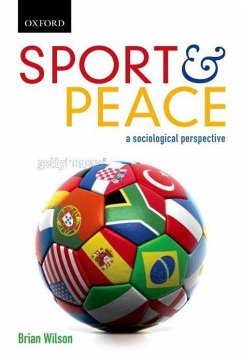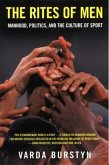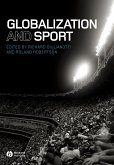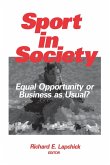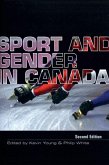- Broschiertes Buch
- Merkliste
- Auf die Merkliste
- Bewerten Bewerten
- Teilen
- Produkt teilen
- Produkterinnerung
- Produkterinnerung
Sport and Peace: A Sociological Perspective applies a critical lens to the function of sport in society, particularly in terms of its relationship to peace and conflict, and helps students to understand the debates in the field as well as the research and possible practical solutions to resolve or address the issues it presents.
Over the past decade the social role of sport has received unprecedented attention, as global leaders ranging from politicians to high-profile celebrities have championed sport as a tool for promoting peace. In many areas, sport has successfully drawn attention to…mehr
Andere Kunden interessierten sich auch für
![The Rites of Men The Rites of Men]() Varda BurstynThe Rites of Men56,99 €
Varda BurstynThe Rites of Men56,99 €![Researching Leisure, Sport and Tourism Researching Leisure, Sport and Tourism]() Jonathan A LongResearching Leisure, Sport and Tourism68,99 €
Jonathan A LongResearching Leisure, Sport and Tourism68,99 €![Globalization and Sport Globalization and Sport]() GiulianottiGlobalization and Sport39,99 €
GiulianottiGlobalization and Sport39,99 €![The Business of Sport The Business of Sport]() Adrian J. TanThe Business of Sport95,99 €
Adrian J. TanThe Business of Sport95,99 €![Sport in Society Sport in Society]() Richard E. LapchickSport in Society122,99 €
Richard E. LapchickSport in Society122,99 €![Sport in Society: Readings in the Sociology of Sport Sport in Society: Readings in the Sociology of Sport]() Joseph G. WeisSport in Society: Readings in the Sociology of Sport118,99 €
Joseph G. WeisSport in Society: Readings in the Sociology of Sport118,99 €![Sport and Gender in Canada Sport and Gender in Canada]() Philip WhiteSport and Gender in Canada61,99 €
Philip WhiteSport and Gender in Canada61,99 €-
-
-
Sport and Peace: A Sociological Perspective applies a critical lens to the function of sport in society, particularly in terms of its relationship to peace and conflict, and helps students to understand the debates in the field as well as the research and possible practical solutions to resolve or address the issues it presents.
Over the past decade the social role of sport has received unprecedented attention, as global leaders ranging from politicians to high-profile celebrities have championed sport as a tool for promoting peace. In many areas, sport has successfully drawn attention to such worthy causes as conflict resolution, HIV prevention, environmental initiatives, and improved international relationships. Yet although sport can be a powerful tool for social good, it continues to reflect and reproduce social inequalities in ways commonly overlooked by those invested in the sport-for-peace movement. In this timely new analysis, Brian Wilson uses critical sociological theories to investigate the complex-and at times controversial-relationship between sport and peace.
Over the past decade the social role of sport has received unprecedented attention, as global leaders ranging from politicians to high-profile celebrities have championed sport as a tool for promoting peace. In many areas, sport has successfully drawn attention to such worthy causes as conflict resolution, HIV prevention, environmental initiatives, and improved international relationships. Yet although sport can be a powerful tool for social good, it continues to reflect and reproduce social inequalities in ways commonly overlooked by those invested in the sport-for-peace movement. In this timely new analysis, Brian Wilson uses critical sociological theories to investigate the complex-and at times controversial-relationship between sport and peace.
Produktdetails
- Produktdetails
- Verlag: Oxford University Press, USA
- Seitenzahl: 256
- Erscheinungstermin: 4. Mai 2012
- Englisch
- Abmessung: 236mm x 155mm x 23mm
- Gewicht: 590g
- ISBN-13: 9780195432145
- ISBN-10: 0195432142
- Artikelnr.: 34554477
- Verlag: Oxford University Press, USA
- Seitenzahl: 256
- Erscheinungstermin: 4. Mai 2012
- Englisch
- Abmessung: 236mm x 155mm x 23mm
- Gewicht: 590g
- ISBN-13: 9780195432145
- ISBN-10: 0195432142
- Artikelnr.: 34554477
Brian Wilson is an associate professor in the School of Human Kinetics at the University of British Columbia, where he specializes in cultural studies and sociology, with a particular focus on media, consumer culture, youth, social inequality, social movements, the environment, qualitative methods, and sport and leisure studies.
* Preface
* Acknowledgements
* Part One Introduction to the Study of Sport, Sociology, and Peace
* 1: Critiquing Sport, Transforming Sport: An Introduction to the Study
of Sport, Sociology, and Peace
* Introduction
* Critiquing Sport, Transforming Sport
* Linking Sport and Peace
* 'Sport' and 'Peace' as Floating Signifiers
* This Book
* Addressing Social Inequality: The Underlying Theme
* My Background and this Book
* A Warning and an Opportunity
* 2: Theory, Sport, and Peace: Tools and Lenses for Seeing Sport 'in
Context'
* Introduction
* Different Lenses, Different Interpretations
* This Chapter
* Seeing Sport 'Up-Close' and 'In Context': Race for the Cure and Why
Theory Is Important
* The Questions We Ask
* Functionalism and Critics
* Sport, Cultural Studies, and Hegemony
* Hegemony, Its Critics, and Why It Is Still Useful
* An Underlying Problem and a Way Forward
* Critical Theories and Contextual Cultural Studies
* Making a Difference In and Through Sport
* Part Two Exploring the 'New and Old' Politics of Sport and Peace
* 3: Sport, Diplomacy, and Nationalism
* Introduction
* A Story about Sport, Sociology, and Politics
* Introducing and Contesting 'the Nation'
* Sport and Nation-Building in Divided Societies
* Reflecting on Sport, Unity, and Community
* Sport, Nationalism, and International Diplomacy
* 'Public Diplomacy' and 'Serious Diplomacy'
* Reflections on Sport, Diplomacy, and the Nation
* 4: Sport, Global Politics, and Peace
* Introduction
* Sport and Politics
* The Decline of the Nation: Setting the Stage for Neoliberalism and
Intensified Globalization
* The Neoliberal Response
* Sociology of Sport and a Critique of Neoliberalism
* Globalization and the Sociology of Sport
* So What is Globalization?
* Concerns and Debates about Sport-Related Globalization
* Glocalization' and Corporate Nationalism
* Globalization, Peace, and Democracy: Contemplating the Golden Arches
Theory of Conflict Prevention
* Reflections on Theory
* Other Understandings of Globalization: Looking Ahead
* Part Three Peace Activism, Peace Education, and a Sporting Praxis
* 5: Pursuing Peace 'From Below': Sport, Social Movements, and (Ironic)
Activism
* Introduction
* Sport and Social Movements: Background
* But What Is Activism, and What Are Social Movements?
* Different Perspectives on Sport and Social Movements
* 'Pre-Political' Resistance and Symbolic Resistance: Social Movements
and Sport-Related Subcultures
* Alter-Globalization, and Sport
* Post-Politics?: Life Politics, Lifestyle Politics, and Sport
* The Success of Movements: Political Opportunity and Resource
Mobilization
* Do Movements Matter?: Hegemony, Ironic Activism, and Reflections on
Theory
* Looking Ahead
* 6: Pursuing Praxis: Peace Education, Critical Pedagogy, and the
Sociology of Sport
* Introduction
* Conscientization, Praxis, and the Sociology of Sport
* So What Is Peace Education?
* Sport, Cultural Studies, and Critical Pedagogy
* Some Sport-Related Critical Pedagogical Practices
* Low Income Women, Recreation, and 'Feminist Participatory Action
Research' (FPAR)
* Functionalism, Prevention, and a Sociological Imagination?: Exploring
Sport Programmes Designed to Support Underserved Youth
* An Extended Case Study of 'Theory Meeting Practice': The Mentors in
Violence Prevention (MVP) Programme
* Using Theory to Link MVP with Other Strategies for Change: Sport
Media and Anti-Violence Education
* A Pro-Feminist Media Education Programme
* Evaluating Change
* Conclusion
* Part Four Key Topics and Pressing Concerns
* 7: Reflections on Intervention and Imperialism in the Sport for
Development and Peace Industry
* Introduction
* Exploring Tensions around Sport and International Development
* Sport-in-International Development: What It Looks Like and What It Is
* Defining 'International Development'
* 'In the Field' With Sport for Development and Peace NGOs: Connecting
Theory and Practice
* The Power of Sport?: Guiding Principles in the Sport of Development
and Peace Movement
* Social Capital and the Mathare Youth Sports Association
* Reflections on Theory and Practice around MYSA
* Football for Peace: A Sociological Imagination and a 'Sport for
Peace' Intervention
* Remaining Cautious about SDP Work
* Conclusion
* 8: Sport, the Environment, and Peace: Debates and Myths about 'Carbon
Neutral' Sport
* Introduction
* Exploring Controversies around Sport and the Environment
* This Chapter
* Sport, Recreation, Environmental Issues, and Peace: An Introduction
* The Sociology of Sport and Environmental Issues
* Modernism, Sport, and Perspectives on the 'Human and Non-Human'
Relationship
* Sustainability and the 'Ecological Modernist' Response
* What's Wrong with Ecological Modernization?
* Sport, the Environment, and Neoliberalism
* A Closer Look at Ecological Modernization and Sport: The Case of
'Carbon Neutral' Sport Events
* Too Good to be Green?
* Reflections on Sport, the Environment, Power, and Privilege
* 9: Towards a 'Sport for Peace Journalism'?: Problems and
Possibilities in Sport Media
* Introduction
* Sport Media, Peace and Conflict: Themes in the Sociology of Sport
* What Are the Implications of Sport-War Connections?
* Violence is Normalized
* Nuanced Sport Media: Some Reflections, Warnings, and a Way Forward
* Explaining the 'Dominant Frame' and Some Concerns about 'Propaganda'
Models
* Is a 'Sport-for-Peace Journalism' Possible?
* Conclusion
* Part Five Conclusion
* 10: Conclusion: Six Summary Arguments and a 'Minor Utopian' Vision
* Themes in Sport, Sociology, and Peace: A Set of Concluding Arguments
* And Where Do We Go From Here?: Reflections on Social Change and
Strategies to Achieve It
* Final Thoughts: Imagining and Pursuing 'Minor Utopias' and
'Structural Renewal' in and around Sport
* References
* Index
* Acknowledgements
* Part One Introduction to the Study of Sport, Sociology, and Peace
* 1: Critiquing Sport, Transforming Sport: An Introduction to the Study
of Sport, Sociology, and Peace
* Introduction
* Critiquing Sport, Transforming Sport
* Linking Sport and Peace
* 'Sport' and 'Peace' as Floating Signifiers
* This Book
* Addressing Social Inequality: The Underlying Theme
* My Background and this Book
* A Warning and an Opportunity
* 2: Theory, Sport, and Peace: Tools and Lenses for Seeing Sport 'in
Context'
* Introduction
* Different Lenses, Different Interpretations
* This Chapter
* Seeing Sport 'Up-Close' and 'In Context': Race for the Cure and Why
Theory Is Important
* The Questions We Ask
* Functionalism and Critics
* Sport, Cultural Studies, and Hegemony
* Hegemony, Its Critics, and Why It Is Still Useful
* An Underlying Problem and a Way Forward
* Critical Theories and Contextual Cultural Studies
* Making a Difference In and Through Sport
* Part Two Exploring the 'New and Old' Politics of Sport and Peace
* 3: Sport, Diplomacy, and Nationalism
* Introduction
* A Story about Sport, Sociology, and Politics
* Introducing and Contesting 'the Nation'
* Sport and Nation-Building in Divided Societies
* Reflecting on Sport, Unity, and Community
* Sport, Nationalism, and International Diplomacy
* 'Public Diplomacy' and 'Serious Diplomacy'
* Reflections on Sport, Diplomacy, and the Nation
* 4: Sport, Global Politics, and Peace
* Introduction
* Sport and Politics
* The Decline of the Nation: Setting the Stage for Neoliberalism and
Intensified Globalization
* The Neoliberal Response
* Sociology of Sport and a Critique of Neoliberalism
* Globalization and the Sociology of Sport
* So What is Globalization?
* Concerns and Debates about Sport-Related Globalization
* Glocalization' and Corporate Nationalism
* Globalization, Peace, and Democracy: Contemplating the Golden Arches
Theory of Conflict Prevention
* Reflections on Theory
* Other Understandings of Globalization: Looking Ahead
* Part Three Peace Activism, Peace Education, and a Sporting Praxis
* 5: Pursuing Peace 'From Below': Sport, Social Movements, and (Ironic)
Activism
* Introduction
* Sport and Social Movements: Background
* But What Is Activism, and What Are Social Movements?
* Different Perspectives on Sport and Social Movements
* 'Pre-Political' Resistance and Symbolic Resistance: Social Movements
and Sport-Related Subcultures
* Alter-Globalization, and Sport
* Post-Politics?: Life Politics, Lifestyle Politics, and Sport
* The Success of Movements: Political Opportunity and Resource
Mobilization
* Do Movements Matter?: Hegemony, Ironic Activism, and Reflections on
Theory
* Looking Ahead
* 6: Pursuing Praxis: Peace Education, Critical Pedagogy, and the
Sociology of Sport
* Introduction
* Conscientization, Praxis, and the Sociology of Sport
* So What Is Peace Education?
* Sport, Cultural Studies, and Critical Pedagogy
* Some Sport-Related Critical Pedagogical Practices
* Low Income Women, Recreation, and 'Feminist Participatory Action
Research' (FPAR)
* Functionalism, Prevention, and a Sociological Imagination?: Exploring
Sport Programmes Designed to Support Underserved Youth
* An Extended Case Study of 'Theory Meeting Practice': The Mentors in
Violence Prevention (MVP) Programme
* Using Theory to Link MVP with Other Strategies for Change: Sport
Media and Anti-Violence Education
* A Pro-Feminist Media Education Programme
* Evaluating Change
* Conclusion
* Part Four Key Topics and Pressing Concerns
* 7: Reflections on Intervention and Imperialism in the Sport for
Development and Peace Industry
* Introduction
* Exploring Tensions around Sport and International Development
* Sport-in-International Development: What It Looks Like and What It Is
* Defining 'International Development'
* 'In the Field' With Sport for Development and Peace NGOs: Connecting
Theory and Practice
* The Power of Sport?: Guiding Principles in the Sport of Development
and Peace Movement
* Social Capital and the Mathare Youth Sports Association
* Reflections on Theory and Practice around MYSA
* Football for Peace: A Sociological Imagination and a 'Sport for
Peace' Intervention
* Remaining Cautious about SDP Work
* Conclusion
* 8: Sport, the Environment, and Peace: Debates and Myths about 'Carbon
Neutral' Sport
* Introduction
* Exploring Controversies around Sport and the Environment
* This Chapter
* Sport, Recreation, Environmental Issues, and Peace: An Introduction
* The Sociology of Sport and Environmental Issues
* Modernism, Sport, and Perspectives on the 'Human and Non-Human'
Relationship
* Sustainability and the 'Ecological Modernist' Response
* What's Wrong with Ecological Modernization?
* Sport, the Environment, and Neoliberalism
* A Closer Look at Ecological Modernization and Sport: The Case of
'Carbon Neutral' Sport Events
* Too Good to be Green?
* Reflections on Sport, the Environment, Power, and Privilege
* 9: Towards a 'Sport for Peace Journalism'?: Problems and
Possibilities in Sport Media
* Introduction
* Sport Media, Peace and Conflict: Themes in the Sociology of Sport
* What Are the Implications of Sport-War Connections?
* Violence is Normalized
* Nuanced Sport Media: Some Reflections, Warnings, and a Way Forward
* Explaining the 'Dominant Frame' and Some Concerns about 'Propaganda'
Models
* Is a 'Sport-for-Peace Journalism' Possible?
* Conclusion
* Part Five Conclusion
* 10: Conclusion: Six Summary Arguments and a 'Minor Utopian' Vision
* Themes in Sport, Sociology, and Peace: A Set of Concluding Arguments
* And Where Do We Go From Here?: Reflections on Social Change and
Strategies to Achieve It
* Final Thoughts: Imagining and Pursuing 'Minor Utopias' and
'Structural Renewal' in and around Sport
* References
* Index
* Preface
* Acknowledgements
* Part One Introduction to the Study of Sport, Sociology, and Peace
* 1: Critiquing Sport, Transforming Sport: An Introduction to the Study
of Sport, Sociology, and Peace
* Introduction
* Critiquing Sport, Transforming Sport
* Linking Sport and Peace
* 'Sport' and 'Peace' as Floating Signifiers
* This Book
* Addressing Social Inequality: The Underlying Theme
* My Background and this Book
* A Warning and an Opportunity
* 2: Theory, Sport, and Peace: Tools and Lenses for Seeing Sport 'in
Context'
* Introduction
* Different Lenses, Different Interpretations
* This Chapter
* Seeing Sport 'Up-Close' and 'In Context': Race for the Cure and Why
Theory Is Important
* The Questions We Ask
* Functionalism and Critics
* Sport, Cultural Studies, and Hegemony
* Hegemony, Its Critics, and Why It Is Still Useful
* An Underlying Problem and a Way Forward
* Critical Theories and Contextual Cultural Studies
* Making a Difference In and Through Sport
* Part Two Exploring the 'New and Old' Politics of Sport and Peace
* 3: Sport, Diplomacy, and Nationalism
* Introduction
* A Story about Sport, Sociology, and Politics
* Introducing and Contesting 'the Nation'
* Sport and Nation-Building in Divided Societies
* Reflecting on Sport, Unity, and Community
* Sport, Nationalism, and International Diplomacy
* 'Public Diplomacy' and 'Serious Diplomacy'
* Reflections on Sport, Diplomacy, and the Nation
* 4: Sport, Global Politics, and Peace
* Introduction
* Sport and Politics
* The Decline of the Nation: Setting the Stage for Neoliberalism and
Intensified Globalization
* The Neoliberal Response
* Sociology of Sport and a Critique of Neoliberalism
* Globalization and the Sociology of Sport
* So What is Globalization?
* Concerns and Debates about Sport-Related Globalization
* Glocalization' and Corporate Nationalism
* Globalization, Peace, and Democracy: Contemplating the Golden Arches
Theory of Conflict Prevention
* Reflections on Theory
* Other Understandings of Globalization: Looking Ahead
* Part Three Peace Activism, Peace Education, and a Sporting Praxis
* 5: Pursuing Peace 'From Below': Sport, Social Movements, and (Ironic)
Activism
* Introduction
* Sport and Social Movements: Background
* But What Is Activism, and What Are Social Movements?
* Different Perspectives on Sport and Social Movements
* 'Pre-Political' Resistance and Symbolic Resistance: Social Movements
and Sport-Related Subcultures
* Alter-Globalization, and Sport
* Post-Politics?: Life Politics, Lifestyle Politics, and Sport
* The Success of Movements: Political Opportunity and Resource
Mobilization
* Do Movements Matter?: Hegemony, Ironic Activism, and Reflections on
Theory
* Looking Ahead
* 6: Pursuing Praxis: Peace Education, Critical Pedagogy, and the
Sociology of Sport
* Introduction
* Conscientization, Praxis, and the Sociology of Sport
* So What Is Peace Education?
* Sport, Cultural Studies, and Critical Pedagogy
* Some Sport-Related Critical Pedagogical Practices
* Low Income Women, Recreation, and 'Feminist Participatory Action
Research' (FPAR)
* Functionalism, Prevention, and a Sociological Imagination?: Exploring
Sport Programmes Designed to Support Underserved Youth
* An Extended Case Study of 'Theory Meeting Practice': The Mentors in
Violence Prevention (MVP) Programme
* Using Theory to Link MVP with Other Strategies for Change: Sport
Media and Anti-Violence Education
* A Pro-Feminist Media Education Programme
* Evaluating Change
* Conclusion
* Part Four Key Topics and Pressing Concerns
* 7: Reflections on Intervention and Imperialism in the Sport for
Development and Peace Industry
* Introduction
* Exploring Tensions around Sport and International Development
* Sport-in-International Development: What It Looks Like and What It Is
* Defining 'International Development'
* 'In the Field' With Sport for Development and Peace NGOs: Connecting
Theory and Practice
* The Power of Sport?: Guiding Principles in the Sport of Development
and Peace Movement
* Social Capital and the Mathare Youth Sports Association
* Reflections on Theory and Practice around MYSA
* Football for Peace: A Sociological Imagination and a 'Sport for
Peace' Intervention
* Remaining Cautious about SDP Work
* Conclusion
* 8: Sport, the Environment, and Peace: Debates and Myths about 'Carbon
Neutral' Sport
* Introduction
* Exploring Controversies around Sport and the Environment
* This Chapter
* Sport, Recreation, Environmental Issues, and Peace: An Introduction
* The Sociology of Sport and Environmental Issues
* Modernism, Sport, and Perspectives on the 'Human and Non-Human'
Relationship
* Sustainability and the 'Ecological Modernist' Response
* What's Wrong with Ecological Modernization?
* Sport, the Environment, and Neoliberalism
* A Closer Look at Ecological Modernization and Sport: The Case of
'Carbon Neutral' Sport Events
* Too Good to be Green?
* Reflections on Sport, the Environment, Power, and Privilege
* 9: Towards a 'Sport for Peace Journalism'?: Problems and
Possibilities in Sport Media
* Introduction
* Sport Media, Peace and Conflict: Themes in the Sociology of Sport
* What Are the Implications of Sport-War Connections?
* Violence is Normalized
* Nuanced Sport Media: Some Reflections, Warnings, and a Way Forward
* Explaining the 'Dominant Frame' and Some Concerns about 'Propaganda'
Models
* Is a 'Sport-for-Peace Journalism' Possible?
* Conclusion
* Part Five Conclusion
* 10: Conclusion: Six Summary Arguments and a 'Minor Utopian' Vision
* Themes in Sport, Sociology, and Peace: A Set of Concluding Arguments
* And Where Do We Go From Here?: Reflections on Social Change and
Strategies to Achieve It
* Final Thoughts: Imagining and Pursuing 'Minor Utopias' and
'Structural Renewal' in and around Sport
* References
* Index
* Acknowledgements
* Part One Introduction to the Study of Sport, Sociology, and Peace
* 1: Critiquing Sport, Transforming Sport: An Introduction to the Study
of Sport, Sociology, and Peace
* Introduction
* Critiquing Sport, Transforming Sport
* Linking Sport and Peace
* 'Sport' and 'Peace' as Floating Signifiers
* This Book
* Addressing Social Inequality: The Underlying Theme
* My Background and this Book
* A Warning and an Opportunity
* 2: Theory, Sport, and Peace: Tools and Lenses for Seeing Sport 'in
Context'
* Introduction
* Different Lenses, Different Interpretations
* This Chapter
* Seeing Sport 'Up-Close' and 'In Context': Race for the Cure and Why
Theory Is Important
* The Questions We Ask
* Functionalism and Critics
* Sport, Cultural Studies, and Hegemony
* Hegemony, Its Critics, and Why It Is Still Useful
* An Underlying Problem and a Way Forward
* Critical Theories and Contextual Cultural Studies
* Making a Difference In and Through Sport
* Part Two Exploring the 'New and Old' Politics of Sport and Peace
* 3: Sport, Diplomacy, and Nationalism
* Introduction
* A Story about Sport, Sociology, and Politics
* Introducing and Contesting 'the Nation'
* Sport and Nation-Building in Divided Societies
* Reflecting on Sport, Unity, and Community
* Sport, Nationalism, and International Diplomacy
* 'Public Diplomacy' and 'Serious Diplomacy'
* Reflections on Sport, Diplomacy, and the Nation
* 4: Sport, Global Politics, and Peace
* Introduction
* Sport and Politics
* The Decline of the Nation: Setting the Stage for Neoliberalism and
Intensified Globalization
* The Neoliberal Response
* Sociology of Sport and a Critique of Neoliberalism
* Globalization and the Sociology of Sport
* So What is Globalization?
* Concerns and Debates about Sport-Related Globalization
* Glocalization' and Corporate Nationalism
* Globalization, Peace, and Democracy: Contemplating the Golden Arches
Theory of Conflict Prevention
* Reflections on Theory
* Other Understandings of Globalization: Looking Ahead
* Part Three Peace Activism, Peace Education, and a Sporting Praxis
* 5: Pursuing Peace 'From Below': Sport, Social Movements, and (Ironic)
Activism
* Introduction
* Sport and Social Movements: Background
* But What Is Activism, and What Are Social Movements?
* Different Perspectives on Sport and Social Movements
* 'Pre-Political' Resistance and Symbolic Resistance: Social Movements
and Sport-Related Subcultures
* Alter-Globalization, and Sport
* Post-Politics?: Life Politics, Lifestyle Politics, and Sport
* The Success of Movements: Political Opportunity and Resource
Mobilization
* Do Movements Matter?: Hegemony, Ironic Activism, and Reflections on
Theory
* Looking Ahead
* 6: Pursuing Praxis: Peace Education, Critical Pedagogy, and the
Sociology of Sport
* Introduction
* Conscientization, Praxis, and the Sociology of Sport
* So What Is Peace Education?
* Sport, Cultural Studies, and Critical Pedagogy
* Some Sport-Related Critical Pedagogical Practices
* Low Income Women, Recreation, and 'Feminist Participatory Action
Research' (FPAR)
* Functionalism, Prevention, and a Sociological Imagination?: Exploring
Sport Programmes Designed to Support Underserved Youth
* An Extended Case Study of 'Theory Meeting Practice': The Mentors in
Violence Prevention (MVP) Programme
* Using Theory to Link MVP with Other Strategies for Change: Sport
Media and Anti-Violence Education
* A Pro-Feminist Media Education Programme
* Evaluating Change
* Conclusion
* Part Four Key Topics and Pressing Concerns
* 7: Reflections on Intervention and Imperialism in the Sport for
Development and Peace Industry
* Introduction
* Exploring Tensions around Sport and International Development
* Sport-in-International Development: What It Looks Like and What It Is
* Defining 'International Development'
* 'In the Field' With Sport for Development and Peace NGOs: Connecting
Theory and Practice
* The Power of Sport?: Guiding Principles in the Sport of Development
and Peace Movement
* Social Capital and the Mathare Youth Sports Association
* Reflections on Theory and Practice around MYSA
* Football for Peace: A Sociological Imagination and a 'Sport for
Peace' Intervention
* Remaining Cautious about SDP Work
* Conclusion
* 8: Sport, the Environment, and Peace: Debates and Myths about 'Carbon
Neutral' Sport
* Introduction
* Exploring Controversies around Sport and the Environment
* This Chapter
* Sport, Recreation, Environmental Issues, and Peace: An Introduction
* The Sociology of Sport and Environmental Issues
* Modernism, Sport, and Perspectives on the 'Human and Non-Human'
Relationship
* Sustainability and the 'Ecological Modernist' Response
* What's Wrong with Ecological Modernization?
* Sport, the Environment, and Neoliberalism
* A Closer Look at Ecological Modernization and Sport: The Case of
'Carbon Neutral' Sport Events
* Too Good to be Green?
* Reflections on Sport, the Environment, Power, and Privilege
* 9: Towards a 'Sport for Peace Journalism'?: Problems and
Possibilities in Sport Media
* Introduction
* Sport Media, Peace and Conflict: Themes in the Sociology of Sport
* What Are the Implications of Sport-War Connections?
* Violence is Normalized
* Nuanced Sport Media: Some Reflections, Warnings, and a Way Forward
* Explaining the 'Dominant Frame' and Some Concerns about 'Propaganda'
Models
* Is a 'Sport-for-Peace Journalism' Possible?
* Conclusion
* Part Five Conclusion
* 10: Conclusion: Six Summary Arguments and a 'Minor Utopian' Vision
* Themes in Sport, Sociology, and Peace: A Set of Concluding Arguments
* And Where Do We Go From Here?: Reflections on Social Change and
Strategies to Achieve It
* Final Thoughts: Imagining and Pursuing 'Minor Utopias' and
'Structural Renewal' in and around Sport
* References
* Index

